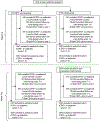Precancerous cervical lesions caused by non-vaccine-preventable HPV types after vaccination with the bivalent AS04-adjuvanted HPV vaccine: an analysis of the long-term follow-up study from the randomised Costa Rica HPV Vaccine Trial
- PMID: 35709811
- PMCID: PMC9255557
- DOI: 10.1016/S1470-2045(22)00291-1
Precancerous cervical lesions caused by non-vaccine-preventable HPV types after vaccination with the bivalent AS04-adjuvanted HPV vaccine: an analysis of the long-term follow-up study from the randomised Costa Rica HPV Vaccine Trial
Abstract
Background: In women vaccinated against human papillomavirus (HPV), reductions in cervical disease and related procedures results in more women having intact transformation zones, potentially increasing the risk of cervical lesions caused by non-vaccine-preventable HPV types, a phenomenon termed clinical unmasking. We aimed to evaluate HPV vaccine efficacy against cervical intraepithelial neoplasia grade 2 or worse (CIN2+) and cervical intraepithelial neoplasia grade 3 or worse (CIN3+) attributed to non-preventable HPV types in the long-term follow-up phase of the Costa Rica HPV Vaccine Trial (CVT).
Methods: CVT was a randomised, double-blind, community-based trial done in Costa Rica. Eligible participants were women aged 18-25 years who were in general good health. Participants were randomly assigned (1:1) to receive an HPV 16 and 18 AS04-adjuvanted vaccine or control hepatitis A vaccine, using a blocked randomisation method (permuted block sizes of 14, 16, and 18). Vaccines in both groups were administered intramuscularly with 0·5 mL doses at 0, 1, and 6 months. Masking of vaccine allocation was maintained throughout the 4-year randomised trial phase, after which participants in the hepatitis A virus vaccine control group were provided the HPV vaccine and exited the study; a screening-only, unvaccinated control group was enrolled. The unvaccinated control group and HPV vaccine group were followed up for 7 years, during which treatment allocation was not masked. One of the prespecified primary endpoints for the long-term follow-up phase was precancers associated with HPV types not prevented by the vaccine, defined as histologically confirmed incident CIN2+ events or CIN3+ events attributed to any HPV type except HPV 16, 18, 31, 33, and 45. Our primary analytical period was years 7-11. Primary analyses were in all participants with at least one follow-up visit and excluded participants with a previous endpoint (ie, modified intention-to-treat cohort). Safety endpoints have been reported elsewhere. This trial is registered with ClinicalTrials.gov, NCT00128661 and NCT00867464. The randomised, masked trial phase is completed; an unmasked subset of women in the HPV-vaccinated group is under active investigation.
Findings: Between June 28, 2004, and Dec 21, 2005, 7466 participants were enrolled (HPV vaccine group n=3727 and hepatitis A virus vaccine control group n=3739). Between March 30, 2009, and July 5, 2012, 2836 women enrolled in the new unvaccinated control group. The primary analytical cohort (years 7 to 11) included 2767 participants in the HPV vaccine group and 2563 in the unvaccinated group for the CIN2+ events endpoint assessment and 2826 participants in the HPV vaccine group and 2592 in the unvaccinated control group for the CIN3+ events endpoint assessment. Median follow-up during years 7 to 11 for women included for the CIN2+ events analysis was 52·8 months (IQR 44·0 to 60·7) for the HPV vaccine group and 49·8 months (42·0 to 56·9) for the unvaccinated control group. During years 7 to 11, clinical unmasking was observed with a negative vaccine efficacy against CIN2+ events attributed to non-preventable HPV types (-71·2% [95% CI -164·0 to -12·5]), with 9·2 (95% CI 2·1 to 15·6) additional CIN2+ events attributed to non-preventable HPV types per 1000 HPV-vaccinated participants versus HPV-unvaccinated participants. 27·0 (95% CI 14·2 to 39·9) fewer CIN2+ events irrespective of HPV type per 1000 vaccinated participants were observed during 11 years of follow-up. Vaccine efficacy against CIN3+ events attributed to non-preventable HPV types during years 7 to 11 was -135·0% (95% CI -329·8 to -33·5), with 8·3 (3·0 to 12·8) additional CIN3+ events attributed to non-preventable HPV types per 1000 vaccinated participants versus unvaccinated participants.
Interpretation: Higher rates of CIN2+ events and CIN3+ events due to non-preventable HPV types in vaccinated versus unvaccinated participants suggests clinical unmasking could attenuate long-term reductions in high-grade disease following successful implementation of HPV vaccination programmes in screened populations. Importantly, the net benefit of vaccination remains considerable; therefore, HPV vaccination should still be prioritised as primary prevention for cervical cancer.
Funding: National Cancer Institute and National Institutes of Health Office of Research on Women's Health.
Translation: For the Spanish translation of the abstract see Supplementary Materials section.
Copyright © 2022 Elsevier Ltd. All rights reserved.
Conflict of interest statement
Declaration of interests JTS and DRL report that they are named inventors on US Government-owned HPV vaccine patents with expired licenses to GlaxoSmithKline and Merck. All other authors declare no competing interests.
Figures
References
-
- IARC Working Group on the Evaluation of Carcinogenic Risks to Humans. Biological Agents. International Agency for Research on Cancer, 2012.
-
- Wheeler CM, Castellsagué X, Garland SM, et al. Cross-protective efficacy of HPV-16/18 AS04-adjuvanted vaccine against cervical infection and precancer caused by non-vaccine oncogenic HPV types: 4-year end-of-study analysis of the randomised, double-blind PATRICIA trial. Lancet Oncol 2012; 13: 100–10. - PubMed
Publication types
MeSH terms
Substances
Associated data
Grants and funding
LinkOut - more resources
Full Text Sources
Medical
Research Materials



